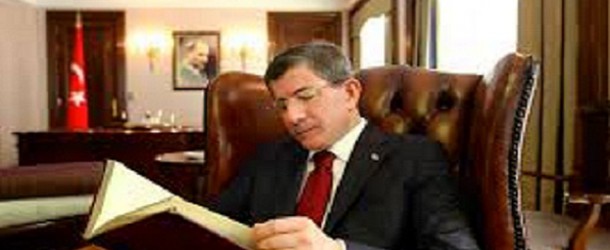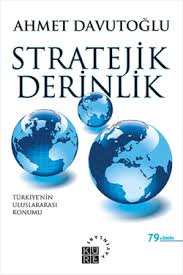Turkey’s newly elected President of the Republic, Mr. “Undefeatable”, Recep Tayyip Erdoğan recently announced that he will support his Foreign Minister Prof. Ahmet Davutoğlu to replace him in the party congress that will be organized this week.[1] The phenomenal Justice and Development Party is an interesting democratic political party which is based on complete loyalty towards the undisputed leader (Erdoğan) and it would be absurd to think of a second candidate who will challenge Davutoğlu in the congress. Thus, we can easily name Davutoğlu as Turkey’s new Prime Minister.
Davutoğlu is an interesting and controversial political figure that needs to be analyzed closely. Some call him as the reincarnation of Enver Pasha[2], whereas some others praise him for his pro-democratic and humanitarian stance vis-à-vis popular based revolution movements in Middle East and North African countries. Ahmet Davutoğlu was born in Turkey’s conservative capital Konya (also the hometown of first popular Islamist politician Necmettin Erbakan) in 1959. His family origin goes back to Crimea and some even claim that he comes from a Crimean Karaite Jewish family.[3] Davutoğlu was graduated from İstanbul Erkek Lisesi, which is a Deutsche Auslandsschule (German International School) and studied at the Department of Economics and Political Science of the Boğaziçi (Bosphorus) University in İstanbul, one of the most prestigious higher education institutions in Turkey known with its pro-Western liberal tradition. He holds a Master’s degree in Public Administration and a PhD degree in Political Science and International Relations from Boğaziçi University. Between 1993 and 1999, he worked at Marmara University and became a full professor in 1999.[4] He was the chairman of the Department of International Relations at Beykent University in Istanbul, Turkey. Between 1995 and 1999, he wrote weekly columns for Turkish Islamist daily Yeni Şafak. His wife Sare Davutoğlu is a medical doctor known for her Islamist worldview and Davutoğlu is the father of four children. Davutoğlu is a talented academic and the author of best-seller scientific books including Alternative Paradigms: The Impact of Islamic and Western Weltanschauungs on Political Theory, The Civilizational Transformation and The Muslim World, Stratejik Derinlik (Strategic Depth) and Küresel Bunalım. Especially his book Strategic Depth has become a very influential book in Turkey’s foreign policy orientation.[5] Davutoğlu is very influential in the military, academic and government triangle shaping Turkish foreign policy and was named as one of the top 100 global thinkers by American magazine Foreign Policy in 2010.[6] Davutoğlu is a moderate Islamist who looks for an increasing role in world politics for Turkey especially concerning its “near abroad” geography.
Hungry not only in politics
Davutoğlu was often associated with neo-Ottomanism, a new ideological orientation which favors a kind of commonwealth with Turkey’s neighbors and the revival of old Ottoman connections. Although he never accepted the term, Davutoğlu’s ideological positioning and foreign policy aims clearly favor such a labeling. Davutoğlu published his chef d’oeuvre Stratejik Derinlik (Strategic Depth) in 2001.[7] In this book, he claimed that classical realist legacies of Turkish Foreign Policy including respecting territorial integrity of all states, resolution of problems through reconciliation and dialogue, remaining within the Western alliance through NATO membership and the EU accession process should be kept, but since these tendencies are designed for the Cold War period, there should be new openings considering Turkish Foreign Policy in the post-Cold War period.[8] The theoretical background of Davutoğlu’s foreign policy approach presents a synthesis of four fundamental factors. According to Kısacık, “as being dependent on conjuncture, one of these factors forestalls another factor and the dimension among them is not important”.[9]
Strategic Depth
The first factor in Davutoğlu’s approach in Turkish Foreign Policy is based on idealism, which is inspired by Immanuel Kant’s thoughts. Davutoğlu underscores that there exist valid ethical values for every actor of the international relations. Just as in the daily social relations between real persons, states should act in an honest and just manner.[10] The second factor is diachronicism in which it is a methodological approach limited with historical-cultural references utilized by Davutoğlu in explaining the global relations and Turkish foreign policy.[11] He alleges that Turkey has not used the advantages provided by the Ottoman heritage in the foreign policy followed by Turkey since the establishment of the Republic and thus Turkey has been in a dilemma with how to deal with regional developments emerging in the aftermath of Cold War. In this context, Davutoğlu views the formation of a sphere of influence in the former Ottoman geography by Turkey. The third factor is geopolitical attitude. By merging the classical geopolitical terms with cultural objects, Davutoğlu mentions that a new geoculture is emerging in the Islamic world. The main feature of this geoculture is pluralism within the unity.[12] The unifying factor of the Muslim world is the awakening of a civilization as a response to modernization and its universal variables. According to Davutoğlu, when you draw a line from Germany France, and Italy to Russia in the north, China and India in the East, the most powerful economy in the region which stays in between is Turkey. Thus, for Davutoğlu, Ankara cannot turn a blind eye to any problem in its region. The “World Island” is seen by Davutoğlu as lying from China to North Africa which is “Traditional/Geopolitical Order”. Davutoğlu’s Heartland is Balkans-Caucasia-Middle East triangle. He thinks that if Turkey manages to constitute an order in this region, it will be influential in the global level as well. The last foundational factor is the integration models. Davutoğlu considers the likelihood of Ankara’s integration with neighboring countries and regions.[13] He notices that the abolishment of economic boundaries among countries which are situated in the same geography and which have cultural affinities will, for a while, be able to bring a very powerful political cooperation provided that the process is managed well. Here it can be said that the integration model of Davutoğlu’s foreign policy approach is under the influence of two important integration theories, namely Ernst Haas’s Neo-Functionalism and Karl Deutsch’s Security Communities.
Davutoğlu started to shape Turkish Foreign Policy in accordance with his theoretical tendencies and ambitions first as an advisor and then -starting from 2009- as Turkey’s Minister of Foreign Affairs. He was appointed as Minister of Foreign Affairs in 2009 despite not being a member of Parliament. He entered into the Turkish Grand National Assembly as an MP for Konya in the 2011 general elections and continued serving as Foreign Minister in Recep Tayyip Erdoğan’s third cabinet. Davutoğlu labeled his new foreign policy approach with the popular slogan “zero problems with neighbors (komşularla sıfır sorun)” and tried to establish friendly political and rising economic and cultural relations with former Ottoman territories in the Middle East, North Africa, Balkans and Caucasia. He thought that as a pivotal country, Turkey should be the most active actor in the region in diplomatic negotiations processes.[14] Davutoğlu’s strategy worked very well until the end of 2011 and Turkey achieved to strengthen its political, economic and cultural ties with neighboring countries including Syria, Iraq, Iran, Greece and Azerbaijan while being still a part of the Western security and political umbrella. However, the tidal waves of the Arab Spring started to shake Davutoğlu’s plans. Davutoğlu’s aim was to direct neighboring anti-democratic countries around Turkey to embrace free-market economics and multiparty democracy in time, thanks to political, economic and cultural integration between two sides by using Turkey’s “soft power”. However, the rupture and the vacuum of power that the Arab Spring created ruined Davutoğlu’s strategy and forced him to make a choice between having good relations with anti-democratic neighboring regimes like Syria’s Bashar al Assad, or supporting democracy as a member of Western democratic system. Davutoğlu chose democracy and Turkey began to change its attitude towards authoritarian regimes by taking the sides of revolutionary masses in the Arab street. This strategy worked well at the beginning in Tunisia, Egypt and Libya but starting from Syrian civil war, the Western strategy started to weaken Turkey’s position. Especially Turkey’s help to armed opposition made Turkey an unwanted actor in the region and spoiled its relations with the Russian Federation, People’s Republic of China, Islamic Republic of Iran, Syria, Egypt (after the fall of Mursi and the takeover of Sisi) and Israel. Thus, Turkey became the only country in the world enjoying the privilege of sustaining negative relations with Israel and Iran at the same time. Davutoğlu became the target of severe critics in Turkish and international media after the transformation of revolutionary movements during the Arab Spring into bloody civil wars like in the case of Syria.
After witnessing what has been happening in the Middle East during the Arab Spring, one might claim that Davutoğlu’s pro-democratic stance was ethically correct but politically naïve since the Arab Spring once again showed that democratic consolidation is very difficult in geographies where democratic culture and economic progress is low. Tunisia now seems the only successful country after the Arab Spring and Turkey completely lost its mediating role in the region. Syrian civil war assured Turkey’s failure in becoming a regional power that could change the picture by itself without the support of global actors such as the USA. One might here question whether Turkey could have used its hard power in other to facilitate the change and democratic transformation in the region. However, the recent ISIS massacres which prove the radical nature of Sunni opposition and the anti-Western bloc’s (Russia, Iran, China) attitude in Syria shows that it would be too risky for Turkey to engage in such an adventurist strategy. Thus, we can claim that the Syrian crisis and civil war was an end to Davutoğlu’s neo-Ottoman dreams for the moment and showed that Turkey has not enough power and potential to revitalize the Ottoman Empire in the region. New Prime Minister Davutoğlu will now probably make a revision in Turkey’s foreign policy and embrace again the “soft power” method in order to increase Turkey’s political, economic and cultural relations with neighboring countries.
Assist. Prof. Dr. Ozan ÖRMECİ
[1] “Turkey chooses Ahmet Davutoglu as prime minister”, Big News Network, Date of Accession: 25.08.2014 from http://www.bignewsnetwork.com/index.php/sid/224972449.
[2] Ismail Enver Pasha (22 November 1881 – 4 August 1922) was an Ottoman military officer and a leader of the 1908 Young Turk Revolution. He was the main leader of the Ottoman Empire in both Balkan Wars and World War I. Throughout his career, he was known by increasingly elevated titles as he rose through military ranks, including Enver Efendi (انور افندي), Enver Bey (انور بك), and finally Enver Pasha, “Pasha” being the epithet Ottoman military officers gained after they were promoted to the rank of Mirliva. For details see; http://en.wikipedia.org/wiki/Enver_Pasha.
[3] “Davutoglu’s Crimean-Karaite Jewish origin”, Turkish News, Date of Accession: 25.08.2014 from http://www.turkishnews.com/en/content/2013/01/12/davutoglus-crimean-karaite-jewish-origin/.
[4] “Ahmet Davutoğlu”, Wikipedia, Date of Accession: 25.08.2014 from https://en.wikipedia.org/wiki/Ahmet_Davuto%C4%9Flu.
[5] Available at Amazon; http://www.amazon.com/The-Strategic-Depth/dp/6140100909/ and at Idefix in Turkish; http://www.idefix.com/kitap/stratejik-derinlik-ahmet-davutoglu/tanim.asp?sid=SD7PHDJVKD3D8TUWGFOJ.
[6] “The FP Top 100 Global Thinkers”, Foreign Policy, Date of Accession: 25.08.2014 from http://www.foreignpolicy.com/articles/2010/11/29/the_fp_top_100_global_thinkers.
[7] Kasapoğlu, Can (2012), “Turkey’s new ‘Strategic Depth’”, The Jerusalem Post, Date of Accession: 25.08.2014 from http://www.jpost.com/Opinion/Op-Ed-Contributors/Turkeys-new-Strategic-Depth.
[8] Kısacık, Sina (2012), “The Turkish Foreign Policy and in Justice and Development Party Era and the ‘Axis Shift’ Debate”, Uluslararası Politika Akademisi, Date of Accession: 25.08.2014 from http://politikaakademisi.org/the-turkish-foreign-policy-in-justice-and-development-party-era-and-the-axis-shift-debate/.
[9] Kısacık, Sina (2012), “The Turkish Foreign Policy and in Justice and Development Party Era and the ‘Axis Shift’ Debate”, Uluslararası Politika Akademisi, Date of Accession: 25.08.2014 from http://politikaakademisi.org/the-turkish-foreign-policy-in-justice-and-development-party-era-and-the-axis-shift-debate/.
[10] Kısacık, Sina (2012), “The Turkish Foreign Policy and in Justice and Development Party Era and the ‘Axis Shift’ Debate”, Uluslararası Politika Akademisi, Date of Accession: 25.08.2014 from http://politikaakademisi.org/the-turkish-foreign-policy-in-justice-and-development-party-era-and-the-axis-shift-debate/.
[11] Ahmet Davutoğlu (2008), Stratejik Derinlik: Türkiye’nin Uluslararası Konumu, İstanbul: Küre Yayınları, pp. 73-74, Aktaran: Kısacık, Sina (2012), “The Turkish Foreign Policy and in Justice and Development Party Era and the ‘Axis Shift’ Debate”, Uluslararası Politika Akademisi, Date of Accession: 25.08.2014 from http://politikaakademisi.org/the-turkish-foreign-policy-in-justice-and-development-party-era-and-the-axis-shift-debate/.
[12] Atilla Sandıklı (2011), “Jeopolitik Teoriler ve Türkiye”, in Dünya Jeopolitiğinde Türkiye, ed. Hasret Çomak, İstanbul: Hiperlink Yayınları, pp. 362-364, Aktaran: Kısacık, Sina (2012), “The Turkish Foreign Policy and in Justice and Development Party Era and the ‘Axis Shift’ Debate”, Uluslararası Politika Akademisi, Date of Accession: 25.08.2014 from http://politikaakademisi.org/the-turkish-foreign-policy-in-justice-and-development-party-era-and-the-axis-shift-debate/.
[13] Sedat Laçiner (2010), “Yeni Dönemde Türk Dış Politikasının Felsefesi, Fikri Altyapısı ve Hedefleri”, in Yeni Dönemde Türk Dış Politikası: Uluslararası IV. Türk Dış Politikası Sempozyumu Tebliğleri, ed. Osman Bahadır Dinçer, Habibe Özdal, Hacali Necefoğlu, Ankara: USAK Yayınları, p. 17, Aktaran: Kısacık, Sina (2012), “The Turkish Foreign Policy and in Justice and Development Party Era and the ‘Axis Shift’ Debate”, Uluslararası Politika Akademisi, Date of Accession: 25.08.2014 from http://politikaakademisi.org/the-turkish-foreign-policy-in-justice-and-development-party-era-and-the-axis-shift-debate/.
[14] Zengin, Gürkan (2010), Hoca: Türk Dış Politikasında “Davutoğlu Etkisi”, İstanbul: İnkilap Kitabevi, pp. 91-92, Aktaran: Kısacık, Sina (2012), “The Turkish Foreign Policy and in Justice and Development Party Era and the ‘Axis Shift’ Debate”, Uluslararası Politika Akademisi, Date of Accession: 25.08.2014 from http://politikaakademisi.org/the-turkish-foreign-policy-in-justice-and-development-party-era-and-the-axis-shift-debate/.




























































Comments are closed.